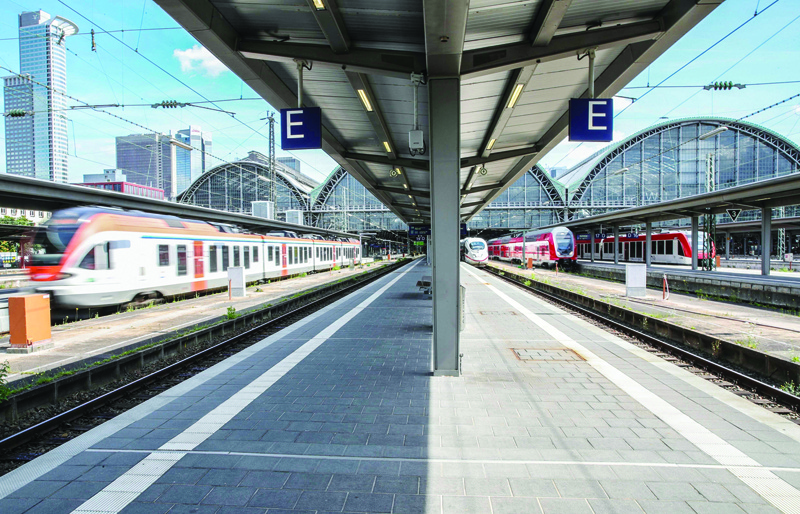 FRANKFURT, Hessen: File photo shows an empty platform at the main railway station in Frankfurt am Main, western Germany, during a strike of train drivers. – AFP
FRANKFURT, Hessen: File photo shows an empty platform at the main railway station in Frankfurt am Main, western Germany, during a strike of train drivers. – AFP
FRANKFURT: Germany's passenger train network faces a second round of strikes tomorrow and disruption to freight services this weekend, adding more pain to the tourist season and already strained supply chains. The latest move in an escalating wage dispute will impact passenger services from 2:00 am (0000 GMT) on August 23 and last 48 hours, the head of the GDL train drivers union Claus Weselsky told reporters Friday.
The industrial action affecting cargo trains will begin August 21 and end at the same time four days later, the union head said. "Deutsche Bahn has up to this point not given notice that it will make any concessions in the pay dispute it started," Weselsky said, referring to the German rail operator.
"The GDL sees itself forced to call for new strikes at Deutsche Bahn," he said. Deutsche Bahn criticised the announcement of the new strike, saying in a statement that it was "a wholly unnecessary burden for our passengers and freight clients". Earlier this month, the union led a walkout after its members voted 95 percent in favour, following the collapse of pay talks with Deutsche Bahn.
On Germany's long-distance rail network, carriages were packed as only 25 percent of the scheduled service ran, during the two-day strike which began in the morning of August 11. Deutsche Bahn's freight service DB Cargo was also severely impacted, adding to delivery delays for German businesses already hit by shortages in raw materials and components from timber and steel to computer chips.
'Wrong signal'
The announcement of more strikes sends the "wrong signal at the wrong time", according to Siegfried Russwurm, head of the influential Federation of German Industry (BDI). "This strike will put an almost incalculably heavy burden not just on industry, but on the whole of society," he said in a statement.
Deutsche Bahn was already contending with huge losses as demand for travel drastically shrank during the pandemic which erupted in March 2020. It has also been struggling to rebuild long stretches of track destroyed by deadly floods that struck western Germany in mid-July. At the core of the dispute, the union is demanding a 1.4-percent pay hike and a bonus of 600 euros ($700) for 2021, and a further wage rise of 1.8 percent in 2022.
Deutsche Bahn had offered to phase in a 3.2-percent wage increase in two steps in 2022 and 2023. The slower increases proposed by Deutsche Bahn are necessary to "tackle the negative impact of the coronavirus pandemic" on the company's finances, it said in a statement. The last major conflict between unions and Deutsche Bahn took place between 2014-2015, when over nine months GDL organised nine rounds of strikes to demand regulatory reforms. The stoppage in May 2015 of six consecutive days has held the record as the longest in the company's history. A shorter strike hit rail traffic in December 2018, when a stoppage was called for four hours. - AFP

